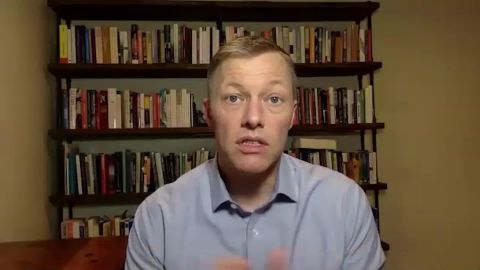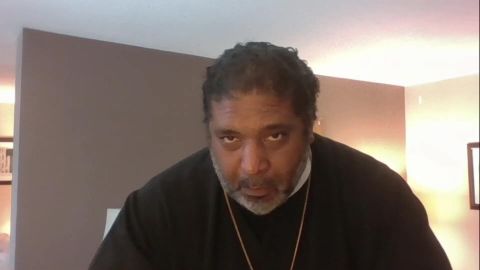Read Transcript EXPAND
CHRISTIANE AMANPOUR: And now, with little access to affordable housing, the majority of poor Americans spend more than half of their incomes on keeping a roof over their heads, which, for many, means ending up on the street if they can’t. The Eviction Lab at Princeton University proposes remedies that are in turn the key to economic mobility. Professor Matthew Desmond’s book “Evicted: Poverty and Profit in the American City” was awarded a Pulitzer Prize in 2017. Here he is talking to our Michel Martin about how the system got so broken.
MICHEL MARTIN: Thanks, Christiane. Professor Desmond, thank you so much for joining us.
MATTHEW DESMOND, AUTHOR, “EVICTED: POVERTY AND PROFIT IN THE AMERICAN CITY”: Thank you for having me.
MARTIN: I have to say that, if you live in a city, maybe even a suburb, this is a story that’s like right in front of your face. I mean, we have all seen this. We have all seen people’s belongings piled up on the sidewalk. We have all seen a rental van sort of frantically throwing people’s stuff in it. And yet the scope of this is something that I just don’t think a lot of people think about. So, when did it get to be this way?
DESMOND: Yes. On the one hand, poor Americans have always struggled with housing. There is a story of tenements. There is a story of living underground without heat and running water. So, on the one hand, it’s an old story. On the other hand, when you read newspaper accounts of evictions from the ’30s or ’40s, you’re struck by how strange and scandalous they were. There are reports in “The New York Times” in the ’30s that say, three people are getting evicted in the Bronx, and hundreds of people showed up to protest. That’s not where we are right now in this moment. Right now, we have gotten quite used to the sound of the knock on the door and the early truck rumbling through your neighborhood. Evictions have become incredibly commonplace in the lives of many Americans.
MARTIN: And why?
DESMOND: This problem has three main ingredients. Incomes for many Americans have been very stagnant over the last 10 years, even over the last 40 years. In many parts of the country, real incomes have fallen. But what has not been stagnant is housing cost. Rents and utility costs have risen incredibly fast over the last 15 years. So, there’s this shrinking gap between what many Americans are earning at work and what they have to pay for basic shelter needs. And then we might say, well, wait a minute, where’s the government here? Where’s public housing? Or I have heard of housing doctors. Don’t they help? And the answer is that they absolutely do help, but they’re only for a small minority of families that need them. Only one in four families who qualify for any kind of housing assistance receive it, which means most poor renting families today in America spent over half of their income on housing costs. And one in four of those families are spending over 70 percent of their income just on rent and utilities.
MARTIN: There’s no entitlement to safe and decent shelter in this country. It’s like a lottery system, I mean, because if only one in four of the people who are eligible get it, then it’s really luck, right?
DESMOND: Yes, a lottery is the exact way many policy-makers describe our current housing situation. I have two young children. If I applied for public housing today in Washington, D.C., for example, chances are, I would be a grandfather by the time my application came up for review. The waiting list for public housing in some of our largest cities is not counted in years anymore. It’s counted in decades. All of us know that we need stable, affordable housing to live. This is essential to us. But our country has not invested in this fundamental human need.
MARTIN: One of the other things that struck me is that you have been assembling a database that did not exist. And this is incredible, because this is a country that loves to count everything. ‘ We love to count everything.
DESMOND: Right.
MARTIN: We can tell you at any sort of given point how many trees we have planted on any given street and when they were planted. So how is it that we didn’t know this? So, how did you notice this, is what I’m asking you?
DESMOND: So, I wrote a book in Milwaukee, and I looked at the eviction numbers in Milwaukee, and I thought, gosh, these are really high. One in 14 homes in the inner city of Milwaukee is evicted every year. That’s an astounding number. And so when I started talking to communities around the country about my book, I’d be in Houston or L.A. or Baton Rouge, Louisiana, and people would say, well, what’s eviction like in my community? Are we higher or lower? What cities are doing it right? Which policies work? And we had no answers to these questions. The federal government doesn’t collect data on eviction. It doesn’t even collect data on eviction from its own housing, from public housing. So, we were really designing policy in the dark. Imagine if we didn’t know how many car accidents happened every year in America, how many kids graduated from high school. That’s kind of the state of our knowledge about eviction. So, we took it on ourselves to build the first ever national database of eviction, but I think this is really a job that the federal government should be doing.
MARTIN: Here’s another point that you make in the book. You say: “If incarceration had come to define the lives of men from impoverished black neighborhoods, eviction was shaping the lives of women. Poor black men were locked up. Poor black women were locked out.” Why is that?
DESMOND: Go into any housing court all around the country, and you will just see rows and rows of moms with their kids there. We can’t understand the eviction crisis without understanding the history of racism in America and the systematic dispossession of people of color, and particularly African-Americans, from the land, from the soil of America. That started in slavery and went through sharecropping. You can follow that trend through the Great Migration and the ghettoization of black folks. It took Martin Luther King getting murdered on a Memphis balcony to end racial segregation in the housing market. But when that happened, there are other things African-Americans confronted. Racial discrimination still exists in large part today. And you can follow it all the way up to the subprime lending crisis, where we know communities of color were targeted by predatory lending institutions. And so most white Americans are homeowners, but most black and Latino Americans are renters in America because of that history. So, they’re exposed in new ways. And women are particularly vulnerable in these communities. If they’re single moms, for example, their housing needs to be bigger than if they’re not, because the kids kind of take up more space, and that increases their housing cost. And just the poverty and financial insecurity that many single moms face exposes them to eviction at really high rates.
MARTIN: You know, in your book “Evicted,” you tell the stories of a number of different families, and how they came to go through this. And I do want to mention that all of them are not, you know, single black mothers. There are other people. There are men. There’s a white male nurse who lost his license when he stole opiates from his patients. There’s a — there are a number of other people. But I do want to ask you to sort of tell me a story of one of the people who you say sort of typifies the eviction crisis. I was thinking maybe Arleen. Tell me her story. Like, how did this happen to her? And how does her story exemplify all the others that you want to tell?
DESMOND: Sure. So, you’re right. Eviction affects communities all across the country. It affects white communities, Latino communities, African-American communities. About one in five of all American renters is now spending over half of their income on housing costs. So, it is a widespread problem. But someone like Arleen really does typify the face of the eviction crisis in America. So, when I first met Arleen, she was a single mom. She’s an African- American woman. She was raising two kids. And when I met her, she was spending over 88 percent of her income on rent, just on rent. Forget about utilities. So, how is that even possible? Well, what Arleen would do is, she would pay the landlord in the winter, when there was a moratorium on utilities shutoffs, heat shutoffs. But when that moratorium lifted in April, she had to pay the utility company, so she could be back in the block come next winter. And so these are the kind of situations so many Americans are facing. Should I pay my landlord or the utility company? Should I buy food or pay the rent? And Arleen is facing that situation every month. When she got evicted, it wasn’t necessarily because she made a mistake or had an emergency in her life. Her eviction is much more the result of inevitability than irresponsibility, when you’re paying so much of your income just for basic housing.
MARTIN: I’m glad you mentioned that, because one of the points that you make in the book is, I think a lot of people have this idea that people get evicted just because they don’t know how to handle their money, that they’re just irresponsible, or maybe they’re playing — they’re buying their kids a PlayStation, when they really should be paying their rent, or they’re just — they just can’t handle their money. They just don’t know how they don’t have the skills, and they should take a class or something like that.
DESMOND: Right.
MARTIN: And you found — and tell me what you have to say about that.
DESMOND: I think that that kind of idea, that harm is being visited to families because they messed up, gives us some comfort. It makes us think we can control our lives. If we play by the rules, it’ll be OK for us. But there are a lot of Americans that are playing by the rules, that are working hard, that are taking care of their kids, that are sacrificing, and they’re still facing this problem, not by the thousands or the tens of thousands, but by the millions every year in this country. This is not just a situation of spending your money on a PlayStation or being irresponsible. This is a situation where rents have gone out of control. And millions of Americans can no longer afford basic shelter.
MARTIN: And it’s a snowball effect. I mean, one of the points that you make very clearly is that this snowballs, because you’re constantly getting knocked down to the bottom of the hill, and you have to climb your way back up. And if you lose everything, or at least you lose some things, then what do you do? You get back into shelter. You have no savings, you have no cushion, and then you have got this record that follows you. What’s the consequence of having this sort of eviction as a part of your financial record? What happens?
DESMOND: It’s huge. So, when evictions goes through the court process, there’s a record that’s created. And that record is public, and it’s published. Often, it’s published online for anyone to see. And when landlords see that, they often say no, because, from a landlord’s point of view, that’s a big deal. That’s a marker of risk that maybe this person isn’t going to be a good tenant for me. So, that means families who get evicted are pushed into worse neighborhoods and into worse housing after they move, because a landlord is seeing that mark. And they’re saying no. The mark of eviction can keep you out of public housing, because many public housing authorities actually view an eviction record as a mark against your application. That means we’re systematically denying housing help to the families that need it the most. Eviction records are reported to credit bureaus as well. And I think this is a really important point to stress now in COVID. There’s going to be a lot of families that are going to get that eviction record.
MARTIN: Well, currently, though, I understand that a number of cities have imposed eviction moratoriums.
DESMOND: Right.
MARTIN: Is that pretty much of a nationwide standard? I mean, the fact that most states at some point did impose these shutdown orders, has that intervened in this crisis?
DESMOND: I think the media coverage of the moratoriums has been too rosy, honestly. They’re having some states, Massachusetts, Connecticut, Delaware, Minnesota, that have rolled out pretty strong moratoriums stopping eviction and…
MARTIN: Mm-hmm.
DESMOND: But there are a lot of states that haven’t. By our estimate, there are about 31 million renters living in states where the moratoriums are very weak. And even in states where the moratoriums were OK, and they stopped evictions, those are starting to expire. So now we’re hearing stories of eviction court being held over Zoom or over the phone, which means we care about the safety of court officers, but not the safety of families that are going to lose their home and their shelter. And I think that the big question is, what’s going to happen to the millions of renters who have been protected over the last two months, but as those moratoriums lift in the summer, what’s going to happen next?
MARTIN: Can we talk about landlords, though, for a minute? What’s their role in this? I mean, you have met a lot of landlords. Like, what’s their deal? How do they see this? Because the overwhelming majority of landlords are still individuals, aren’t they? I mean, they’re not these big corporations, or are they?
DESMOND: Yes, that’s a hard question to actually answer. It’s a hard question to know who owns our cities. Many even individual proprietors will use LLCs and other companies to do their business. And so, if you asked who are the top evicting landlords in Washington, D.C., who are the landlords that aren’t doing a lot of evictions those are really hard questions. And it really shows the gaps in our data too. Now, from a landlord’s point of view, they haven’t received rent, which means they haven’t received income. And, for many, they’re stretched, and they have bills to pay as well. So, a lot of times, when we talk about these issues, we say, OK, are we on the tenant’s side are we on the landlord’s side? We don’t need to do that. The system isn’t working. It’s not working for both parties now. An eviction is not going to solve the landlord’s problem. What’s going to solve the landlord’s problem is a serious injection of relief for both the tenants and property owners to get us through this spell.
MARTIN: But you have made the point that the voucher system isn’t working. Why is that?
DESMOND: OK, let’s break this down. When we first started public housing in the country, we started very late. And the modern public housing system, these ideas, these towering buildings in Chicago or Saint Louis or Atlanta, when families first moved into those buildings, they thought it was amazing often. They said, this is incredible, because, remember, they’re moving from slums. They were moving from incredibly dangerous, degrading housing. Now, that policy was also infused by American racism. Public housing concentrated racism — race and it concentrated poverty in a way that reflected our national sin. And so that was absolutely unconscionably wrong. But it was also true that public housing failed because we made it fail. We defunded public housing. President Reagan cut the budget for public housing by over 60 percent, 6-0 percent. Any program we have in America is going to fail with that kind of cut. And so, when those towers went down, they didn’t go down because the idea necessarily was corrupt at the root. They went down because we choked them to death. Now, what arose from their ashes was this idea of housing vouchers. If I qualify for a voucher, I can take that ticket, I can live anywhere I want in the private rental market, as long as my housing isn’t too expensive or too shoddy. It has to pass basic tests. And instead of paying 50, 60 percent of my income to rent, I pay 30, and the voucher covers the rest. Does that work? Absolutely, that works. I mean, studies that show, when families receive a voucher, they move to better neighborhoods, they don’t move as much. Studies consistently find that, when families receive that ticket, they do one thing with their income, which is, they buy more food. Their kids become stronger. Now, they work. The thing that’s not working about them is, they’re a lottery, that most families that need them don’t get them. So, are they perfect? No. But what is the big problem? It’s that waiting list. That’s the big problem with vouchers.
MARTIN: And I also heard you say that you think we’re on the cusp of another eviction crisis because of the severe job loss that we have experienced over the last couple of months, as the response to the COVID-19 health crisis. So what’s keeping you up at night right now and what’s giving you hope right now?
DESMOND: So, unless we have a serious intervention in the eviction crisis, it’s hard for us not to anticipate a wave of eviction and homelessness that’s going to wash over the country throughout the summer and into the fall as the eviction moratoriums lift. I think eviction for many of us have become something we reach to, when — so fast when a tenant can’t make the rent. And this isn’t all property owners, but this is a good amount of them. And I think we need rent relief at the scale of the problem. If we don’t get it, we’re going to have more disease spread, we’re going to have more poverty spread and more social suffering in the country. That is keeping me up at night. What I’m hopeful about is what’s happening on our streets today. I’m hopeful that the country is having a moral reckoning with its legacies of racism. Anyone who studies a social problem like eviction or incarceration or job loss, we quickly realized that racism is at the very heart of that problem. This is at the heart of the eviction crisis and it’s the heart of many social ills around the country. And so I’m hopeful that we, as a nation, are at a place where we can fully face the sins of our past, the sins of our present, where we can enter into a new chapter, where we actually believe and act on the values we profess, that there should be equality under the law, that there should be equal opportunity, and where you’re born shouldn’t dictate your future.
MARTIN: Professor Desmond, Matthew Desmond, thank you so much for speaking with us today.
DESMOND: Thank you, Michel, for having me.
About This Episode EXPAND
The managing director of the International Monetary Fund joins Christiane for an exclusive interview. The Reverend William Barber discusses structural racism and poverty. Anne Milgram discusses President Trump’s dismissal of SDNY Attorney Geoffrey Berman. Princeton sociologist Matthew Desmond explains how COVID-19 could exacerbate the eviction crisis in the United States.
LEARN MORE



